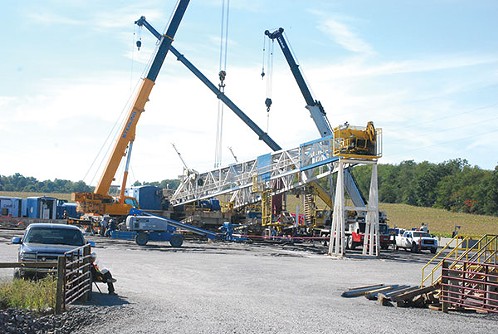The state’s Department of Environmental Protection recently released documents supporting its rewrite of Pennsylvania’s rules for oil and gas drilling. Those rules had not been updated since 2001 — several years before the Marcellus Shale boom dramatically increased gas drilling here and fundamentally altered its character.
But how much would the proposed regulations — which might take effect as soon as this summer — actually change how drilling is done?
The DEP itself characterizes this as a necessary update to protect public health, safety and the environment. The drilling industry criticizes the changes as a needless intrusion that would cost it a lot of money for no environmental benefit. Most environmental groups, meanwhile, welcome the rules as an improvement, while adding that much more is needed.
The new regs separately address new “conventional” wells and “unconventional”
wells; the latter are those that use horizontal drilling and hydrofracturing to access shale gas a mile or more deep. Hydrofracturing involves huge quantities of water. Unconventional wells are both more numerous and more affected by the changes.

Yet in some ways, the new rules are pretty limited. For instance, they apply only to surface activities at well sites. No changes are required underground, where the gas is actually found and extracted, or along the state-wide network of pipelines, compressor stations and more where it is processed and sent to market.
One change involves the open pits that drillers use to store drill cuttings and flowback fluids from the wells, a practice that environmentalists have long said poses unacceptable risks to air and water quality. Pennsylvania has thousands of active wells. Each unconventional well uses up to 5 million gallons of water to break up the rock containing the gas; flowback fluid contains salt, heavy metals and toxic chemicals. The drilling industry contends that such pits can be operated safely. But those DEP documents cite “33 recent cases of liner failures” in pits at drilling facilities. In 2014, for instance, the agency fined the state’s largest driller, Range Resources, $4.15 million for leaks in pits in Washington County.
The new regulations would ban open pits at individual well sites and require drillers to instead store the waste either in tanks or in “centralized impoundments,” which take wastewater from multiple wells and meet stricter construction and monitoring standards than the pits.
Another new rule pertains to gas wells near such “public resources” as parks, historical sites, schools and playgrounds. Some have reported that this rule is a new setback requirement. But in fact, all that the new rule does — all it legally can do, says DEP spokesman Neil Shader — is give DEP a chance to set conditions on drilling at such sites. For instance, Shader says, if a drilling site is within 200 feet of a school, DEP could limit drilling to non-school hours.
The regs would also upgrade cleanup standards for spills and require drillers to ensure that new wells won’t disturb older, existing oil and gas wells.
The Marcellus Shale Coalition, a trade group, says that the new regs are often redundant — “in some cases, a regulation for the sake of a regulation,” says spokesperson Erica Clayton Wright. She adds that the Coalition believes the changes might even exceed DEP’s rulemaking authority. The Coalition estimates the compliance will cost the industry $2 billion per year. That’s a far cry from DEP’s estimate of $73 million in initial costs (mostly for the upgraded centralized impoundments) and $31 million annually.
Among environmental groups, PennEnvironment, which advocates for a statewide fracking ban (like New York’s), favors the new regs. “This is an important step in the right direction,” says Allie DiTucci, head of PennEnvironment’s fracking campaign. Penn Future, which does not favor such a ban, supports the new rules too.
Others are more skeptical. John Detwiler, of grassroots group Marcellus Protest, agrees that the new rules might curb “some of the worst abuses” of industry. But he notes that the rulemaking process took five years. “If that amount of energy went into [changing] energy policy, it would really be constructive,” he says. Marcellus Protect considers fracking unavoidably dirty and dangerous, and a way to extend our dependency on the fossil fuels whose burning contributes to climate change. The group also favors an outright ban.
Gov. Tom Wolf is notably less friendly to the gas industry than was his predecessor, Tom Corbett. Wolf, for instance, re-imposed a moratorium on new leasing of state parks and forests for drilling, and backs a severance tax on gas. However, his administration has no plans to halt fracking. As DEP Secretary John Quigley recently told the online news site PennLive, “We’re roughly a decade into what could be a hundred-year” shale development.
The new rules head to the state’s Environmental Quality Board on Feb. 3, and if approved, to the Independent Regulatory Review Commission. Legislative committees would consider the rules next. A legislative vote is not needed to enact them. That’s good news for DEP: As part of the state’s ongoing budget impasse, the majority-Republican House recently passed a bill that would, among other things, delay enactment of the drilling rules.
While the formal public comment period has ended, citizens can still write to DEP, the EQB and the IRRC about the new regulations. For more information, see the “Oil and Gas Rulemaking” section of www.dep.pa.gov.

